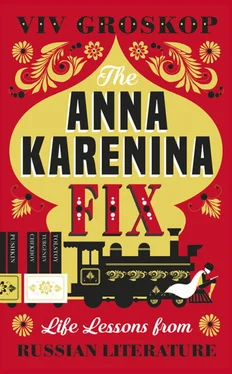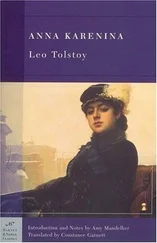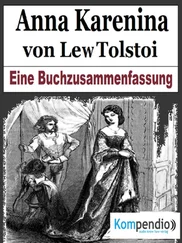Viv Groskop - The Anna Karenina Fix - Life Lessons from Russian Literature
Здесь есть возможность читать онлайн «Viv Groskop - The Anna Karenina Fix - Life Lessons from Russian Literature» весь текст электронной книги совершенно бесплатно (целиком полную версию без сокращений). В некоторых случаях можно слушать аудио, скачать через торрент в формате fb2 и присутствует краткое содержание. Город: London, Год выпуска: 2017, ISBN: 2017, Издательство: Fig Tree, Жанр: Публицистика, Критика, на английском языке. Описание произведения, (предисловие) а так же отзывы посетителей доступны на портале библиотеки ЛибКат.
- Название:The Anna Karenina Fix: Life Lessons from Russian Literature
- Автор:
- Издательство:Fig Tree
- Жанр:
- Год:2017
- Город:London
- ISBN:978-0-241-98126-9
- Рейтинг книги:3 / 5. Голосов: 1
-
Избранное:Добавить в избранное
- Отзывы:
-
Ваша оценка:
- 60
- 1
- 2
- 3
- 4
- 5
The Anna Karenina Fix: Life Lessons from Russian Literature: краткое содержание, описание и аннотация
Предлагаем к чтению аннотацию, описание, краткое содержание или предисловие (зависит от того, что написал сам автор книги «The Anna Karenina Fix: Life Lessons from Russian Literature»). Если вы не нашли необходимую информацию о книге — напишите в комментариях, мы постараемся отыскать её.
‘A passionate, hilarious, joyful love letter to Russian literature’ Allison Pearson, Sunday Telegraph
‘A delightful primer and companion to all the authors you are ashamed to admit you haven’t read’ The Times
The Anna Karenina Fix: Life Lessons from Russian Literature — читать онлайн бесплатно полную книгу (весь текст) целиком
Ниже представлен текст книги, разбитый по страницам. Система сохранения места последней прочитанной страницы, позволяет с удобством читать онлайн бесплатно книгу «The Anna Karenina Fix: Life Lessons from Russian Literature», без необходимости каждый раз заново искать на чём Вы остановились. Поставьте закладку, и сможете в любой момент перейти на страницу, на которой закончили чтение.
Интервал:
Закладка:
If anything, Tolstoy’s new reputation as a more rounded person who ate boiled pears to aid his digestion (no wonder, with all the eggs) – rather than some kind of literary demigod – has enhanced the understanding and appreciation of his work. I certainly feel better for knowing that the eighty-two-year-old Tolstoy went around wearing two hats because he felt the cold on his head, that he loved beans and Brussels sprouts (a rare break from the eggs) and that, on one occasion, his wife was so angry with him for leaving the house without telling her that she stabbed herself with knives, scissors and a safety pin. (Theirs was an extraordinarily volatile relationship, especially in later life, and it was exacerbated – understandably – by Tolstoy’s desire to renounce the works that supported the family financially. Not to mention Sofya Andreyevna’s role as Chief Copier-Outer of the novels.)
In Flight from Paradise , Basinky also revealed Tolstoy to be someone suffering from a lot of problems we would judge as uniquely modern. Whenever any of us reads about someone being hassled on social media and what a contemporary phenomenon this is considered to be, we should think about Tolstoy. He routinely received death threats via telegram, letter and parcel. On his eightieth birthday in 1908, he received a large box containing a length of rope. It’s all very well someone sending you a poison-pen letter. But a length of rope? That is hardcore. The letter accompanying the rope was signed ‘A mother’. His wife, Sofya, opened it and wrote in her diary that the message with it read: ‘There is nothing left for Tolstoy to do but wait for and wish for the government to hang him, and he can save them the trouble.’ Sofya noted that she assumed the woman had lost a child in the revolution in 1905 and blamed Tolstoy for it.
Whenever Tolstoy travelled, he was subject to constant distractions, bombarded by other people’s opinions, thoughts and arguments; it was as if a Twitter-come-to-life materialized before him. (Genuine report: ‘Can I get your autograph, Lev Nikolayevich? By the way, would you ever go in an aeroplane?’ He gave the autograph and said that aeroplanes were a bad idea, as only birds should fly.) At home, it wasn’t much better: people continually came to his house (interrupting, at least, the frequent deliveries of rope) to ask for work or money, or to show him their terrible manuscripts. The only way he could get away from them was to go and visit his sister in the monastery where she lived, which was in itself really stressful, because he had been excommunicated by the Church and was not at all welcome there. Poor Tolstoy.
Knowing that Tolstoy suffered all this after he had renounced Anna Karenina has helped me to be more patient about trying to understand the book’s messages. It is one of the strangest novels, in that it reads so beautifully and easily and is full of light and warmth. And yet, when you sit back and think about its ultimate meaning, it is like the breath of Satan. Its ultimate message? ‘Don’t want anything too selfish because you will end up killing yourself.’ And while the novel has so much soulful joy and gentle humour, and even elements of self-deprecation (especially in Tolstoy’s portrait of Levin, the character most like himself), there is an oddness to the book, a disturbing sense of unresolved conflict.
It doesn’t help, for example, that the heroine doesn’t appear until Chapter Eighteen. When you read this novel for the first time, you also spend a great many pages (sixty or seventy, depending on which edition you’re reading) thinking, ‘Yes, yes, that’s all very well. Some very nice vodka parties and excellent ice skating. But where is – drum roll – Anna Karenina? Isn’t this supposed to be a book about her?’ The moment when she arrives is almost an anticlimax. It’s sudden and brief. Considering this is arguably the greatest heroine in literary history, our first meeting with Anna Karenina is tantalizingly delayed and strangely underwhelming. ‘Vronsky followed the conductor to the carriage and at the door to the compartment stopped to allow a lady to leave.’ A lady! It is the lady! Has there ever been a more low-key introduction? First, the scary, vengeful epigraph. And now this weird lack of focus on the heroine.
Let’s revisit this for a moment. He ‘stopped to allow a lady to leave’. That’s it? That’s her entrance? Really? This is typical Tolstoy. Bring on the most important character seemingly in passing and disturbingly late in the day. Let her emerge out of the background. Don’t make a big deal about it. It’s a deferred entrance that credits the reader with a lot of intelligence, not to mention the patience of a saint. We immediately sense – without having to be told – that the train lady is Anna. We understand (or at least assume) her significance. But the writer respects us enough not to push her in our faces. He does not want to do us the disservice of announcing: ‘Look! It’s Anna Karenina! And she’s doomed! Doomed, I tell you!’ (I can’t help feeling that, if this were Dickens, a passing tramp would announce this. No offence, Dickens.) Of course, by doing something so unusual, so bold and so seemingly discreet (blink and you’ll miss her), Tolstoy presents his heroine even more ostentatiously than if he’d delivered her bursting out of a train-shaped cake dancing the can-can and singing ‘Chattanooga Choo Choo’.
The funny thing is, the whole of the first part of the book is about Stepan Oblonsky – Stiva (yes, it’s the diminutive again) or, in some crazy translations which totally disregard all laws of transliteration and common sense, ‘Steve’ – Anna’s brother, a civil servant and man about town. If the first sixty pages of this novel were anything to go by, then it should be called ‘Anna Karenina’s Brother’ or, perhaps, ‘The Book of Steve’. Although it’s really not a good idea to think of his name being Steve, as these misguided translations suggest. He’s really not a Steve. A Steve would not order oysters and turbot and drink champagne with ladies of dubious morals doused in vinaigre de toilette, a nineteenth-century perfume consisting of plants, woods and spices. If this were not Anna Karenina and instead ‘The Book of Steve’ (sorry, Stiva), I guess this would happen on every page. (I know I’m contradicting myself here, by the way, because I said earlier that I am not fussy about names. But, seriously, Stiva Oblonsky is not a Steve. This is one occasion where correct transliteration is necessary and warranted.)
Arguably, Oblonsky – who goes to meet Anna off the train, where, during the journey, she has just sat next to Vronsky’s mother – is the glue of the whole book. Anna is his sister. Levin is his best friend. Vronsky is his (sort of) work colleague. Stiva is a civil servant and Vronsky is a cavalry officer. They are both members of the aristocracy, and Stiva would make it his business to know everything about everyone in high society. But, of course, this is not a novel about Stepan Oblonsky. It can’t be. Because he is a supposedly happy man who has figured life out. It is a novel about Anna Karenina. It has to be. Because she is an unhappy woman who has not got life figured out. Although there’s already a contradiction here. We can see that Anna’s brother is supposed to be ‘the happy one’. And yet we know that his merry and debauched life has led to misery. He’s having an affair. His wife knows about it, and she’s distraught. He’s devastated, in turn, to have upset her. This is why Anna has come to visit: to console her brother’s wife and plead his case. And this is supposed to be the version of ‘the happy family’. Clearly, we are not meant to take everything at face value.
Neither are we to be distracted by the joyful hedonism of Stiva’s existence, which dominates the early pages of the book. That’s far too enjoyable and, in Tolstoy’s eyes, shallow. Not long after Tolstoy finished Anna Karenina , he wrote in his legendary essay A Confession that the meaninglessness of life is ‘the only indisputable piece of knowledge available to man’. Oh, Tolstoy, you old grump. He foreshadows this thought, just as he foreshadows Anna’s death, with a classic piece of doom-mongering as soon as we meet her. On the next page, once Anna’s beauty, tenderness and inexplicably enigmatic charm have been established, Tolstoy squishes a watchman under the wheels, with some relish. ‘Cut in two pieces, they say.’ ‘Threw himself!… Run over!…’ All right, all right. Don’t go on about it. Anna speaks for Tolstoy at this point: ‘“A bad omen,” she said.’ You don’t say.
Читать дальшеИнтервал:
Закладка:
Похожие книги на «The Anna Karenina Fix: Life Lessons from Russian Literature»
Представляем Вашему вниманию похожие книги на «The Anna Karenina Fix: Life Lessons from Russian Literature» списком для выбора. Мы отобрали схожую по названию и смыслу литературу в надежде предоставить читателям больше вариантов отыскать новые, интересные, ещё непрочитанные произведения.
Обсуждение, отзывы о книге «The Anna Karenina Fix: Life Lessons from Russian Literature» и просто собственные мнения читателей. Оставьте ваши комментарии, напишите, что Вы думаете о произведении, его смысле или главных героях. Укажите что конкретно понравилось, а что нет, и почему Вы так считаете.












